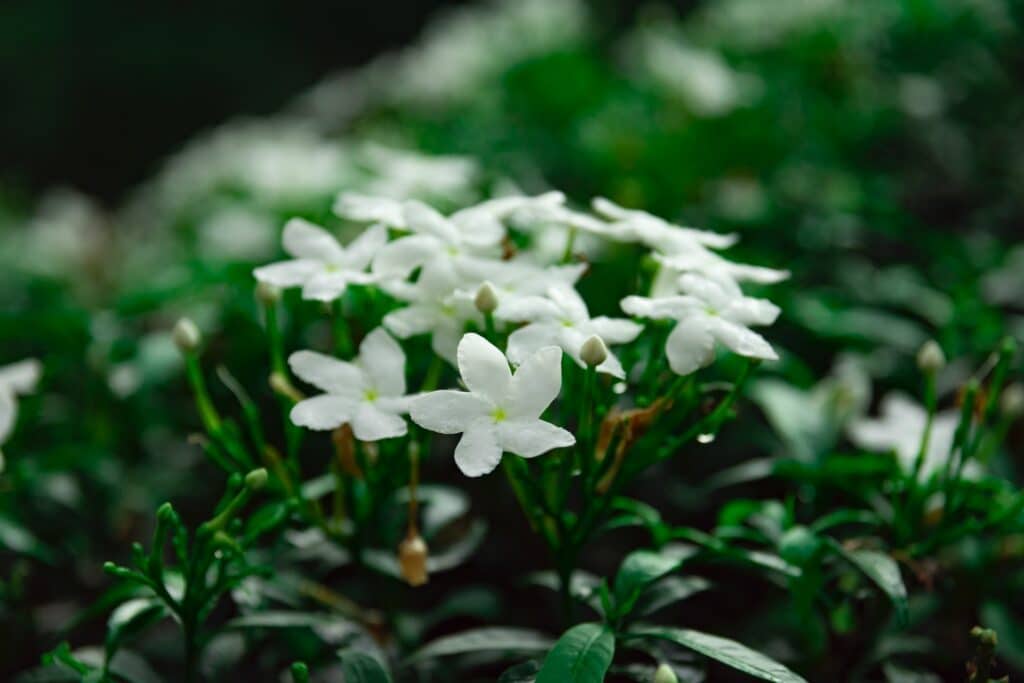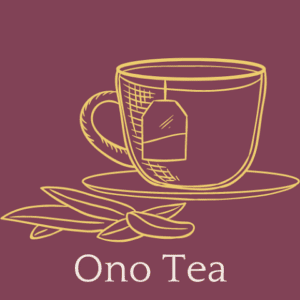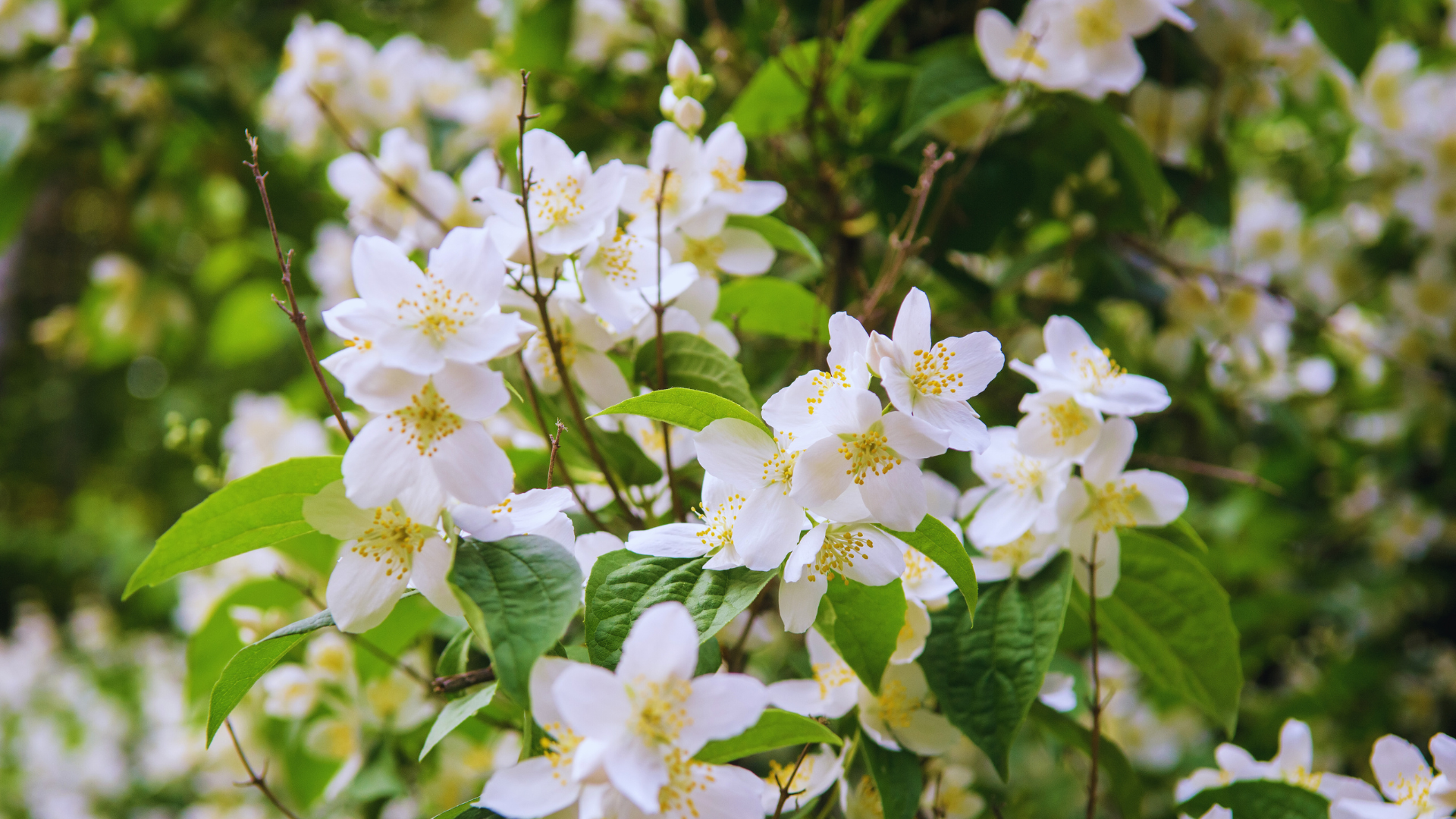Avid tea drinkers understand the rave over jasmine tea. While the delicious hot drink is commonly associated with breakfast and the occasional evening snack in English households, it is common to pair it with every meal of the day in some cultures.
Jasmine tea is a favorite in the community. Thanks to the jasmine blossoms, it has a rich yet delicate aroma, but the taste is similar to any green, black, or white tea. Even for the occasional tea drinker, the scent of jasmine flowers makes it one of the tastiest teas around. Whether you prefer plain loose-leaf tea or jasmine milk tea, it is perfect for any time of day.
What Is Jasmine?
Jasmine is a native plant cultivated for its beauty and fragrance. One can put jasmine tea into two groups. Some of it is made entirely from the jasmine flower; thus, drinkers steep the flowers as one would do leaves. The second type is infused tea, which has a base made from regular tea leaves and is infused with jasmine floral accents.
The tea is unique because of the additional white jasmine blossoms on the plant, which are responsible for the taste and scent. Though jasmine is commonly associated with tea in the Western context, its versatility has made it popular in rice, alcoholic beverages, perfumes, and essential oils.

What Does Jasmine Tea Taste Like?
Jasmine tea tastes sweet and light. The jasmine flower has a delicate floral aroma, which is why many tea drinkers take it plain. But the flavor largely depends on how you brew jasmine tea, too. For instance, is the concentration when using loose tea leaves different than when using tea bags?
The longer your steeping process, the stronger the taste, yielding a slightly bitter flavor. Additionally, adding milk, honey, or sugar can overpower the understated flavor of jasmine tea, which is why many tea drinkers prefer it plain.
Furthermore, jasmine is regularly combined with other tea leaves, altering its taste. For instance, regular black tea may be infused with jasmine pearls to become jasmine black tea. Other factors that may alter the taste are:
- The soil one plants it in
- The subspecies of jasmine
- The weather conditions in the growth process
- The quality of the tea
Benefits of Jasmine Tea
Tea can be an alternative to coffee if you need something light, hot, and less acidic. However, many coffee drinkers dip their toes in green tea, assuming it has a mild flavor. But green tea may be an acquired taste. Jasmine tea is the perfect starting point for becoming familiar with teas. Here are some of the many benefits of including a cup of jasmine tea now and then.
It Promotes Weight Loss
Tea is beneficial when trying to lose a few extra pounds. For starters, drinking a small cup each morning helps moderate your hunger. Jasmine tea contains less caffeine than coffee, but it has enough to energize you at the start of your day. Additionally, plain jasmine tea contains very few calories, so if you hate drinking water, tea could help you curb your hunger while keeping you hydrated.
It Contains Healthy Antioxidants
Jasmine tea is bursting with polyphenols, the same beneficial antioxidants found in fruits like blueberries and cherries. These micronutrients stimulate blood cell production and movement, keeping the blood healthy for use around the body. Additionally, antioxidants help release toxic antibodies and delay cell damage, which helps retain skin elasticity and promotes a supple appearance.
It Helps Protect Your Body From Disease
In ancient times, tea was promoted as an antidote or a healing agent. It provides an extra boost to the immune system, helping it fend off sickness. Adding jasmine tea to your meals can help your body regulate insulin levels, reducing the likelihood of developing diabetes of any type. Jasmine tea contains cancer-prevention properties, too, and the antioxidant EGCG is a molecule that fights heart disease. Therefore, jasmine tea can assist in preventing chronic illnesses.
It Reduces Menstrual, Menopausal, and Pregnancy Discomfort
For women, tea is the perfect addition to the pantry for that time of the month. Jasmine teas help soothe symptoms of pain related to the menstrual cycle by reducing cramping and soreness. For more mature drinkers, jasmine tea is the perfect solution to regulate those terrible hot flashes and abdominal pain. You can also drink jasmine tea during your pregnancy, which helps relieve joint soreness and provides antibiotics to fight infection.
It Promotes Gut Wellness
Jasmine tea can play a crucial role in your digestive tract, keeping your stomach healthy. The jasmine flower eases irritable bowel syndrome and inhibits the growth of pathogens. While E. coli is a relatively harmless bacteria often found in mammals’ gastric tracts, too much disrupts the intestinal tracts. Thus, jasmine moderates even the beneficial bacteria.
It Improves Oral Health
Teas such as jasmine promote dental and oral health. Unlike other beverages with a high sugar concentration, plain tea contains none. It is a light and healthy alternative to coffee and soda, which stain and erode enamel. Jasmine contains catechins, natural chemical compounds which help fight off plaque.
It May Reduce Stress and Anxiety
Scented tea has a calming effect on the body. It contains a chemical called L-theanine, which you also find in certain fungi. Its properties help sedate the body, giving you that soothing feeling when you sip on your favorite tea. L-theanine also stimulates the release of a neurotransmitter called GAMA, which has anxiety-reducing and stress-relieving abilities.

Side-Effects of Jasmine Tea
There Is Caffeine Present in the Tea
Jasmine tea has very few side effects, but it does contain caffeine. Caffeine provides a quick energy boost in trace amounts, but a higher concentration can increase restlessness and insomnia. The good news is that the average individual would have to consume several cups of tea before the caffeine severely affected their body. However, if you are pregnant, you may need to limit the tea you drink to mitigate caffeine consumption.
Catechins May Affect Iron Absorption
Small concentrations of catechins pose very little threat to the average consumer. But, if you are iron deficient, catechins make it harder for your body to absorb the iron it needs.
FAQ
1. Is green tea the same as jasmine?
There is a slight difference between green tea and jasmine. Green tea can be the main component of jasmine tea. However, jasmine tea contains the jasmine flower, which gives it a mild floral flavor and signature fragrance. Additionally, you can add jasmine notes to any kind of tea, while green tea, on the other hand, is a type of tea. Therefore it is common to find white or black jasmine tea.
2. Can I lose weight with jasmine tea?
Including jasmine tea in your diet can help you lose weight. Firstly, the beverage contains caffeine, which dulls hunger cues, allowing you to feel fuller for longer. Additionally, if taken plain, it is a calorie-free drink with properties that remove toxins from the body, keeping you hydrated while your metabolism burns calories.
3. Is jasmine tea expensive?
Jasmine tea is more expensive than regular tea, mainly because of the floral component that has made it popular among tea drinkers. Traditional green, white, and black tea will also increase in price if infused with jasmine.
4. Which is better, green tea or jasmine tea?
Depending on your preferences, either green tea or jasmine may be more beneficial for you. Jasmine is a better choice if you want a calming beverage that reduces body tension and mental stress. However, green tea is often a better choice for weight loss. Some tea drinkers prefer to infuse the two together for maximum benefits.
Final Thoughts
Tea has long been traditionally included in meals throughout the day, particularly in English history, but it has incredible medicinal and healing properties. Jasmine tea, in particular, is loved for its fragrance and mild flavor, making it easier to enjoy plain tea.
The flower is responsible for its floral, sweet taste, and delicate aroma. Though manufacturers combine jasmine blossoms with regular tea leaves, the jasmine flowers can work as tea, too, if you prefer the flowers alone.

